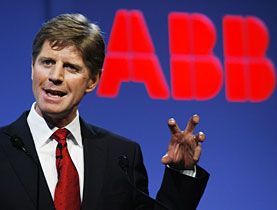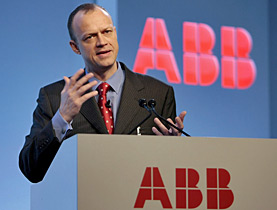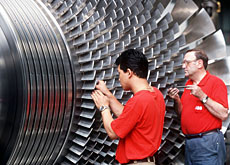ABB accelerates move to cheaper markets

Swiss-Swedish engineering company ABB will speed up its programme of beefing up operations in emerging markets in the face of deteriorating market conditions.
The firm said it must reduce costs and exploit higher demand for its services in countries including Mexico and Poland after profits and orders fell appreciably last year.
ABB announced on Thursday that net profits tumbled by 17 per cent in 2008 to $3.1 billion (SFr3.6 billion). This included an 88 per cent fall in fourth-quarter net profit to $213 million.
The company that specialises in equipment and services for the energy and automotive sectors also cautioned that orders had fallen by about ten per cent in the last three months of 2008 – particularly large scale projects. It plans to reduce costs by $1.3 billion in the next two years.
ABB revealed that it has built or expanded 30 plants in emerging markets in the last year. Staff in countries including Estonia, Vietnam, Brazil and Egypt now make up 44 per cent of total headcount compared with 30 per cent four years ago.
No evacuation
New chief executive Joe Hogan would not comment directly on how this could affect jobs in developed markets, including the home bases of Switzerland and Sweden. But he told swissinfo that the focus was on expanding operations in cost efficient countries.
“It’s going to accelerate. We have to do that in the sense of the economic environment that we are faced with,” he said. “Obviously when order rates are down ten per cent in the fourth quarter, with some businesses down 30 per cent, then we have to take cost actions.”
Hogan, who joined the group a year ago after the shock departure of former CEO Fred Kindle, added that cost reductions would only be made in underperforming divisions in countries with low demand.
“This will not be a complete evacuation from high-cost to low-cost countries,” he said. ABB increased its staff by 8,000 last year to 120,000.
The company also hopes to cash in on infrastructure projects in developed countries financed by a raft of government stimulus packages.
Positive signs
Annual profits were hit by a previously announced $870 million provision largely to cover the costs of investigations in the United States and Europe into suspect payments and alleged anti-competitive practices between 2004 and 2007. Of that sum, $140 million was earmarked for restructuring costs.
ABB said it would halt its SFr2.2 billion ($1.9 billion) share buyback scheme until further notice to safeguard its $5.4 billion cash stockpile. The firm spent $650 million on company takeovers last year and said it would continue to look at small to mid-sized targets.
Hogan admitted that the immediate future was uncertain, but insisted that the company would not cut its previously announced growth targets until 2011.
ABB has enjoyed a remarkable turnaround in fortunes after facing bankruptcy at the turn of the century.
“Orders were down as customers delayed projects or cut capital expenditures. But the long-term drivers of our business – to increase energy efficiency, secure reliable power and improve industrial productivity – have not changed,” he said.
swissinfo, Matthew Allen in Zurich
Net profit: $3.1 billion ($3.76 billion in 2007)
Revenues. $34.9 billion ($29.2 billion)
EBIT (earnings before interest and tax): $4.55 billion ($4 billion)
Total staff: 120,000 (112,000)
A shareholder dividend of SFr0.48 per share has been proposed.
ABB employed 52,659 staff in emerging markets (EMs) in 2008, compared with just under 30,000 in 2004.
The proportion of total group headcount rose from 30% to 44%. Some 45% of all manufacturing employees are based in EMs.
The group has increased its sourcing spending (procurement of goods, materials and services) from EMs by $5 billion since 2005. EMs will provide 40% of the group’s total sourcing by 2010, according to ABB plans.
ABB built or expanded 30 manufacturing plants in EMs last year. The company plans to expand both manufacturing and engineering capacity in these countries in future.

In compliance with the JTI standards
More: SWI swissinfo.ch certified by the Journalism Trust Initiative



You can find an overview of ongoing debates with our journalists here. Please join us!
If you want to start a conversation about a topic raised in this article or want to report factual errors, email us at english@swissinfo.ch.